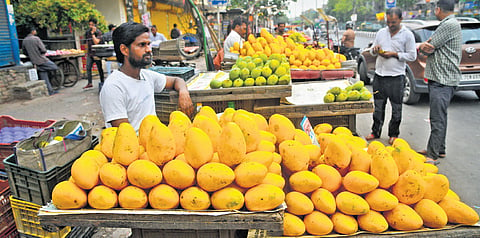

KRISHNAGIRI: In Kondireddipatti, a hamlet not too far away from Krishnagiri, the fragrance of mango fills the hot air. But the usual chitter chatter is missing on the nine-acre mango orchard owned by KM Soundararajan. Like many other farmers, he also managed to harvest only half of last year’s production.
“In 2023, I had managed to produce over 23 tonnes of mangoes, though 50% was affected by disease. This year, we have had a harvest of about six tonnes until now, and at most, we can expect six more tonnes by the end of the season," says Soundararajan, who is also president of Mango Farmers Federation.
The drastic drop in yield has led to a significant reduction in procurement by mango mandi owners, who supply fruits to the pulp industry. VI Mabhu Sheriff, a trader, confirms the fall. “Last year, we procured 50 to 60 tonnes every day, which has now shrunk to 2-3 tonnes. Usually, we also procure only smaller quantities of mangoes from other states. It has gone up significantly this year owing to the situation in Krishnagiri.” Apart from Krishnagiri, mangoes are also cultivated in Salem, Dharmapuri, Theni and Madurai.
On average, a farmer spends Rs 40,000 per acre on irrigated land and Rs 30,000 on rain-fed areas. Of the total coverage of 32,300 hectares in Krishnagiri district, 3,000 hectares are irrigated and the rest are rain-fed. If pests played spoilsport last year, harsh climatic conditions have done the damage this year.
Soundararajan adds, “Usually, a mango tree flowers by December and January. Flowers shrivelled due to the intense heat this year and lack of sufficient rain in the early part of 2024 worsened the situation. The government should provide a compensation of Rs 20,000 per acre for mango farmers and provide an incentive of Rs 5 for every kg produced."
With production taking a major dip, farmers are worried that the total annual yield will not help them recover even pesticide costs. A Abdul Rasheed of MTV Nagar in Krishnagiri cultivates Malgova, Alphonso and Senthora varieties on his 70-acre farm. "The yield stood at 140 tonnes in 2022 and 160 last year. This year, I could harvest only five tonnes so far. I don't see total yield going higher than 15 tonnes," says Rasheed.
Apart from climatic conditions, the export of mango pulp has taken a big hit owing to the Ukraine-Russia war and the Red Sea crisis. Export to Europe and various other countries stood at Rs 2,700 crore in 2023. Industry sources say the markets have been captured by exporters from South America.
E Madhavan, general secretary, of Krishnagiri Mango pulp Processors Federation, says, "Over one lakh tonnes of pulp (Totapuri variety) produced last year has been left unsold. In 2023, we procured about 9 lakh tonnes of mangoes and produced about 4.5 tonnes of pulp. Over 3 lakh tonnes of our procurement came from Krishnagiri. In 2022, we procured 5 lakh tonnes out of which one lakh tonne was from Krishnagiri. This year, we could procure only 500 tonnes so far."
Madhavan wanted the state government to waive the demand charge for electricity incurred by the large pulp industry for using high-tension power as the pulp industry functions only three months a year. He also wanted interest to be waived for last year's loan.
Concurring with the farmers, Krishnagiri Collector KM Sarayu says a recent survey by the horticulture department in the district shows a dip in yield with over 80% of crops being affected by climatic conditions. A report has been sent to the state government, she adds.
Frost in December 2023 followed by intense summer heat this year, coupled with pest attacks, has also taken a toll on cultivation in Dharmapuri. Coverage in the district is 12,600 hectares and 1.4 lakh tonnes of mangoes are produced every year. K Perumal, a mango cultivator from Karimangalam, says farmers like him are staring at a loss of over 80% this year.
Some of the farmers rue that yield has hit an all-time low in the last two decades. J Srinivasan, farmer-cum-retailer in Salem, says, "Last year, we used to receive 100 tonnes of mangoes in the market every day, which has come down to 60 this year, which is a very significant dip."
S Marimuthu, who owns a 60-acre farm in Konganapuram, laments that he is grappling with a huge loss, unable to recover any of his investments.
(With inputs from Jevin Selwyn Henry and K Shakthivel)
Mango variety – price (Rs per kg)
Senthura – 80
Salem Bangalora – 250
Malgova – 240
Alphonso - 150
Banganapalli - 120
Totapuri - 13- 20 ( primarily used by pulp industry)